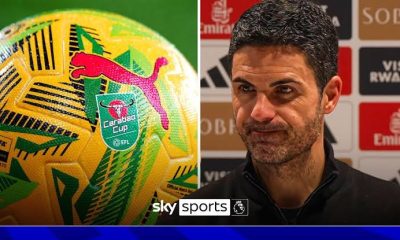LIVERPOOL
Liverpool set to take legal actions against VAR

It was a cold and tense afternoon at the Etihad Stadium in Manchester. The crowd was alive, the noise was deafening, and two of England’s greatest football clubs, Manchester City and Liverpool, stood ready for another chapter in their growing rivalry. But no one inside that blue stadium expected that one moment — one single decision — would spark a storm that would shake the Premier League. This was the day when Virgil van Dijk’s powerful header found the back of the net, Liverpool thought they had equalised, but VAR took it all away. It was the day the world began to question once again what “offside” really meant in football.
The first half of the match had already been full of emotion and intensity. Manchester City, under Pep Guardiola, looked as sharp as ever. They had drawn first blood when Erling Haaland, the man who seems to score every time he breathes near the goal, found the back of the net in the 29th minute. It was classic Haaland — ruthless, calm, and powerful. The Etihad roared as the Norwegian superstar raised his hands to the sky. Liverpool looked stunned, but not defeated. Arne Slot, the man who replaced Jurgen Klopp, stood on the touchline, urging his men to stay calm. The Reds had been in worse positions before, and with players like Mohamed Salah and Virgil van Dijk on the pitch, anything was possible.
Then came the 38th minute — the moment that changed everything. Liverpool won a corner. The crowd quieted for a second as Salah stood by the flag, eyes sharp, studying the movement inside the box. Van Dijk made his usual late run, losing his marker at the perfect time. Salah swung the ball in beautifully, curling toward the near post. Van Dijk rose like a giant above the rest, and with the power of a warrior, smashed a header past Donnarumma into the top corner. It was a goal of pure dominance, a captain’s moment. The Liverpool players screamed, the fans went wild, and Van Dijk punched the air in celebration.
But then came the twist — the assistant referee’s flag went up. Confusion spread across the pitch like fire. The Liverpool players froze in disbelief. Van Dijk looked at the referee, arms open, his face filled with shock. Andy Robertson, who was standing near the goal line, turned around in confusion too. The referee signaled for VAR. It was one of those dreaded moments where time seems to stop. Players stood around, waiting for a decision that could rewrite the game’s story.
After a long check, the verdict came: no goal. Offside. Robertson was ruled to have interfered with play from an offside position. The Liverpool fans gasped. The City fans cheered. Van Dijk’s celebration turned into anger, his jaw tight as he walked back to his half. On the Liverpool bench, Arne Slot shook his head in disbelief. He could not understand it — and he said it later, loud and clear. “It’s obvious and clear that the wrong decision has been made,” he told Sky Sports. “Robertson didn’t interfere at all. The goalkeeper could see everything.”
The replays told their own story. Robertson had stood in front of Donnarumma, back to goal, just as Van Dijk’s header flew past him. He ducked at the last second, letting the ball go through and into the net. For Liverpool, that was nothing but intelligent movement. But for the officials, it was enough to claim interference. The law of the game — Law 11, the one that covers offside — says a player can be punished if they “make an obvious action which clearly impacts the ability of an opponent to play the ball.” To the VAR officials, Robertson’s duck was that “obvious action.”
Van Dijk was furious but tried to keep his cool. “It doesn’t matter what I say,” he told reporters later. “Because anything I say will become a headline. But we all saw what happened.” You could see the anger in his eyes, the same look he had during Liverpool’s tough defeats in the past. For him, this was more than just a mistake — it was a robbery of momentum. If that goal had stood, Liverpool would have been level at 1-1. The game might have taken a different path.
And Wayne Rooney, watching from the commentary box, did not hold back. “That goal should have stood,” he said firmly. “Robertson didn’t block the keeper’s view, and Donnarumma could see the ball clearly. He was never saving that anyway.” Danny Murphy, another former Liverpool man, agreed. “The goal should stand,” he said. “Robertson wasn’t in the line of vision. The rules are killing the game.” Even Gary Neville, a Manchester United legend and usually one of Liverpool’s harshest critics, admitted that it was a strange call. “I’m not sure,” he said during commentary. “Robertson is to the left of Donnarumma — I’m not convinced that he’s affecting the play.”
But VAR thought differently. Inside the control room, with screens flashing from all angles, the officials came to their conclusion. Robertson was offside, and his duck — that simple motion — was enough to confuse the goalkeeper. According to the rule, even if the keeper could see the ball, the mere movement of a player in an offside position could “affect the opponent’s ability to make a play.” It didn’t matter if Donnarumma wouldn’t have saved it. What mattered was that he could have been influenced. That was enough for the goal to be disallowed
BBC’s football correspondent Dale Johnson later explained it clearly. “This decision was not about line of vision,” he said. “It was about an obvious action that could affect an opponent’s ability to play the ball. Robertson ducked under the header — that’s the key.” He even compared it to other cases in Premier League history, like Gylfi Sigurdsson’s disallowed goal for Everton in 2020. The same referee, Chris Kavanagh, had ruled off that goal too. In both cases, a player close to the goalkeeper moved out of the way of a shot while being offside. It was a pattern, a decision style that Kavanagh had shown before.
Still, fans across the world weren’t buying it. Social media exploded. “VAR is ruining football again,” one fan posted. “How can that be offside?” another said. Liverpool fans felt robbed, City fans felt relieved, and neutral fans felt confused. Everyone agreed on one thing: football’s offside rule had become too complicated. It was no longer about clear interference or blocking the view. Now it had turned into interpreting “actions” and “intentions.” It was no longer black and white — it was grey, very grey.
The frustration grew worse after the match ended 3-0. Manchester City went on to dominate, with goals from Nico O’Reilly and Jeremy Doku sealing the victory. But for Liverpool, everything came back to that one disallowed goal. “If it had stood, the game could’ve changed,” said Slot in his post-match interview. “Momentum is everything in football. We were growing into the game, and that decision broke us.”
Even neutral pundits like Dion Dublin couldn’t agree with the call. “Robertson is offside, yes,” Dublin said, “but he’s not blocking Donnarumma. The only player close to his line of sight is Doku. So I think that’s the wrong call.” The football world was divided. Some believed the referees were simply following the letter of the law, while others believed the law itself had lost touch with the spirit of the game.
Meanwhile, in the Premier League’s official explanation, they stood by the referees. “The referee’s call of offside and no goal to Liverpool was checked and confirmed by VAR,” the league’s match centre wrote on social media. “Robertson was in an offside position and deemed to be making an obvious action directly in front of the goalkeeper.” It sounded logical on paper — but in football emotion often outweighs logic.
The story of the disallowed goal became the headline across every newspaper in England. Some called it the “Donnarumma Decision,” others named it “The Duck.” For Liverpool fans, it was simply heartbreak. For City fans, it was justice. But for the game itself, it was another moment that proved VAR was still far from perfect.
In truth, this wasn’t just about one decision. It was about the growing distance between the laws of the game and the feeling of football itself. Football is emotion. It’s the roar when a ball hits the net, the celebration, the heartbreak. When those moments are paused, checked, and reversed by machines, something magical is lost. That’s what Liverpool felt that day — a dream cut short by a replay.
And yet, deep inside, Van Dijk and his teammates knew they would have to move on. The Premier League doesn’t wait for anyone. “We can’t change it now,” Van Dijk said quietly after the game. “We have to respond in the next one.” But even as he spoke, you could tell the moment was replaying in his mind again and again — the run, the header, the cheer, the flag.
Football, in its purest form, is about fairness. Every fan, every player, wants the same thing — a game decided by skill, not by confusion. But that Sunday at the Etihad, confusion ruled the day. The lines blurred, both literally and emotionally. Liverpool walked away empty-handed, City marched toward another victory, and the debate over VAR grew louder than ever before.
The next morning, the front pages told the story: “VIRGIL RAGES OVER VAR,” “SLOT SLAMS OFFICIALS,” “THE DUCK THAT SHOCKED THE PREMIER LEAGUE.” It was not just another football story — it was a reflection of the modern game, where technology meets controversy, and where one man’s duck can decide a nation’s argument.
As the days passed, fans continued to debate. Some said Robertson should have known better. Others said football had lost its humanity. But one truth stood firm: that header from Van Dijk was beautiful, pure, and powerful. And somewhere deep down, even City fans knew that if football had a soul, that goal would have stood.
Because football is not only about rules. It is about moments — and that was one moment that deserved to live. But in a world ruled by replays and regulations, even beauty can be erased by a line on a screen.
And so, Liverpool walked away that night not just defeated, but disbelieving. The scoreline said 3-0 to Manchester City. But for the Reds, it felt like something more had been taken — something that cannot be measured by goals or points. It was the feeling of being cheated by the very system that was meant to protect the game.
That night, under the Manchester lights, Van Dijk’s header never truly died. It lived on — in arguments, in memories, and in the growing question every football fan keeps asking: when will football belong to the players again
-

 Barcelona10 months ago
Barcelona10 months agoVideo | Barcelona’s deceptive free kick against Athletic Bilbao
-

 Manchester United10 months ago
Manchester United10 months ago“I was forced to make that call…the wrong call wasn’t really my decision but they made me do it” I couldn’t do anything about it cause I’m only an official not the owner of the league…They wanted Manchester United to win Liverpool by all means💔”…those were the words of Micheal Oliver the Referee of the Liverpool Vs Manchester United match with strong claims that it wasn’t his decision rather be was ordered to🙀‼️‼️
-

 CHELSEA10 months ago
CHELSEA10 months agoAm tired of this place i want to leave” – Club make bid to sign £380k-per-year Chelsea ace who wants Stamford Bridge exit
-

 LIVERPOOL10 months ago
LIVERPOOL10 months agoLiverpool has officially completed the sensational signing of Spanish international Dani Olmo
-

 CHELSEA10 months ago
CHELSEA10 months agoIt will be amazing if he joins me here at Stamford Bridge. Even though it seems highly unlikely, it won’t kill me to try to convince him to join me here. I would very much love it if he joins me” – This is according to Cole Palmer as he has weighed in on the speculation surrounding Kobbie Mainoo’s potential move to Chelsea. The young midfielder has been the subject of transfer rumors, and Palmer’s reaction has added fuel to the ongoing discussions.
-

 Real Madrid10 months ago
Real Madrid10 months agoAncelotti drops everything on Endrick after the carton facing Minera : « It must be.. ».
-

 Manchester United10 months ago
Manchester United10 months agoRuben Amorim isn’t a baby coach so he should have known best not to start this player against Liverpool,you’ve tried him enough and he’s not giving any good results just get him replaced already, at first I thought it was Marcus Rashford causing the problems but I guess I’m wrong…keep starting him and he’ll get you sacked sooner than expected!” sports pundit Gary Neville speaks on Manchester United Player’s performance against Liverpool today
-

 ARSENAL10 months ago
ARSENAL10 months agoBREAKING NEWS: Arteta Tells £55M Arsenal Star to Find a New Club After Costly Newcastle Error
